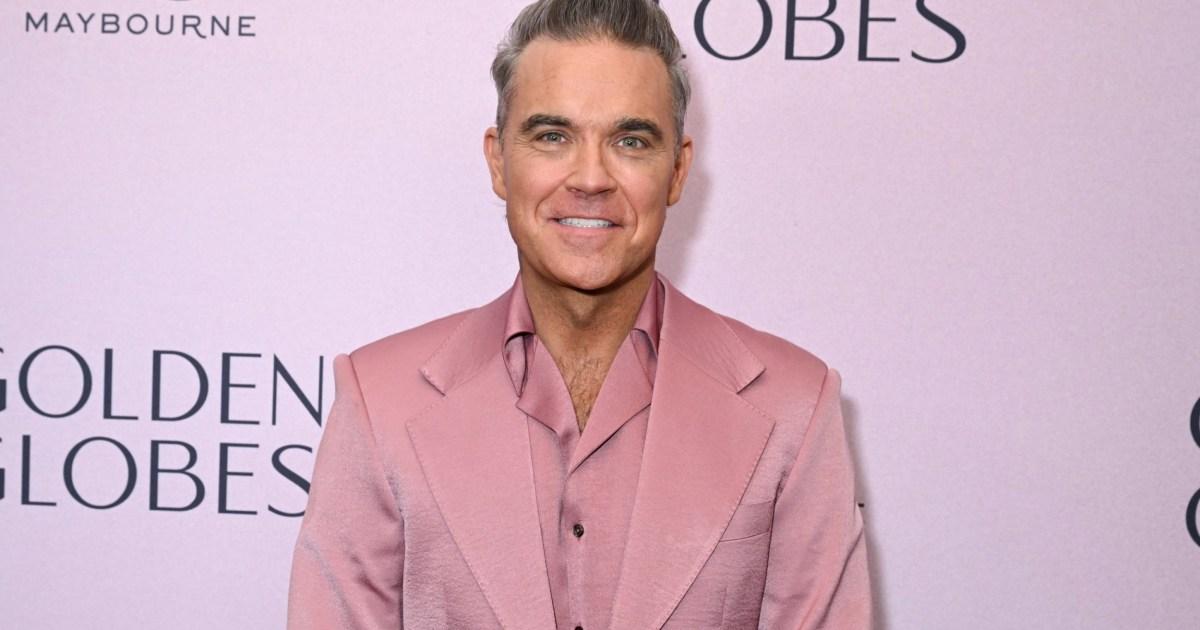Entertainment
Robbie Williams Reveals ‘Inside Tourette’s’ on New Podcast

Robbie Williams, the former lead singer of Take That, has disclosed his struggles with a condition he describes as “inside Tourette’s” during an appearance on the podcast “I’m ADHD! No You’re Not.” The 51-year-old artist opened up about his neurological health issues, revealing that while he experiences Tourette’s tics, they manifest internally rather than outwardly.
Williams explained that his experience involves intrusive thoughts rather than physical tics typically associated with Tourette syndrome. “I’ve just realised that I have Tourette’s, but they don’t come out,” he said. “They are intrusive thoughts that happen.” This insight marks a significant moment in his journey to understanding his mental health.
Understanding Tourette Syndrome
Tourette syndrome is characterized by sudden, repetitive movements or sounds known as tics. According to the NHS, there is no known cure for the condition, but various treatments can help manage symptoms. Tics can be vocal, such as whistling or throat clearing, or motor-related, including eye-rolling and shoulder jerking.
Williams has been candid about his mental health challenges, which also include a previous diagnosis of ADHD and depression. He shared that receiving a formal diagnosis provided temporary relief, but it led him to rely heavily on medication. “There was a relief that I’d got it officially diagnosed, but then also there was more a relief that I was getting 200 of these tablets,” he recounted. “You’re always looking for the cure for the ailment of the disease inside your head.”
Despite his success as a performer, Williams expressed feelings of imposter syndrome and the pressure to mask his true emotions. “You would think that a stadium full of people professing their love to you would work, but whatever it is, inside me, I cannot hear it,” he noted. As he prepares for his current tour, he reflects on his complex relationship with performance. “I’m terrified. I mask, like I’m an Olympian at masking,” he said.
The Impact of Fame and Performance Anxiety
Williams also revealed lingering effects of performance-related trauma from his time with Take That. He described feelings of post-traumatic stress disorder, saying, “I still get triggered from it and it still affects me.” These reflections highlight the mental health struggles that can accompany a life in the spotlight.
The singer’s openness about his experiences contributes to a broader conversation about mental health, particularly in the entertainment industry. Other celebrities have also shared their challenges with Tourette syndrome. Lewis Capaldi, for example, took a hiatus from music in 2023 due to difficulties related to his condition. Similarly, Billie Eilish publicly disclosed her Tourette syndrome diagnosis in 2018, emphasizing the importance of breaking the stigma surrounding such conditions.
Williams’ candid revelations provide insight into the often hidden struggles faced by many individuals, particularly those in high-pressure environments. As he navigates his health challenges, his story resonates with others who may be experiencing similar issues, underscoring the need for understanding and support.
-

 Health3 months ago
Health3 months agoNeurologist Warns Excessive Use of Supplements Can Harm Brain
-

 Health3 months ago
Health3 months agoFiona Phillips’ Husband Shares Heartfelt Update on Her Alzheimer’s Journey
-

 Science1 month ago
Science1 month agoBrian Cox Addresses Claims of Alien Probe in 3I/ATLAS Discovery
-

 Science1 month ago
Science1 month agoNASA Investigates Unusual Comet 3I/ATLAS; New Findings Emerge
-

 Science4 weeks ago
Science4 weeks agoScientists Examine 3I/ATLAS: Alien Artifact or Cosmic Oddity?
-

 Entertainment4 months ago
Entertainment4 months agoKerry Katona Discusses Future Baby Plans and Brian McFadden’s Wedding
-

 Science4 weeks ago
Science4 weeks agoNASA Investigates Speedy Object 3I/ATLAS, Sparking Speculation
-

 Entertainment4 months ago
Entertainment4 months agoEmmerdale Faces Tension as Dylan and April’s Lives Hang in the Balance
-

 World3 months ago
World3 months agoCole Palmer’s Cryptic Message to Kobbie Mainoo Following Loan Talks
-

 Science4 weeks ago
Science4 weeks agoNASA Scientists Explore Origins of 3I/ATLAS, a Fast-Moving Visitor
-

 Entertainment4 months ago
Entertainment4 months agoLove Island Star Toni Laite’s Mother Expresses Disappointment Over Coupling Decision
-

 Entertainment3 months ago
Entertainment3 months agoMajor Cast Changes at Coronation Street: Exits and Returns in 2025









